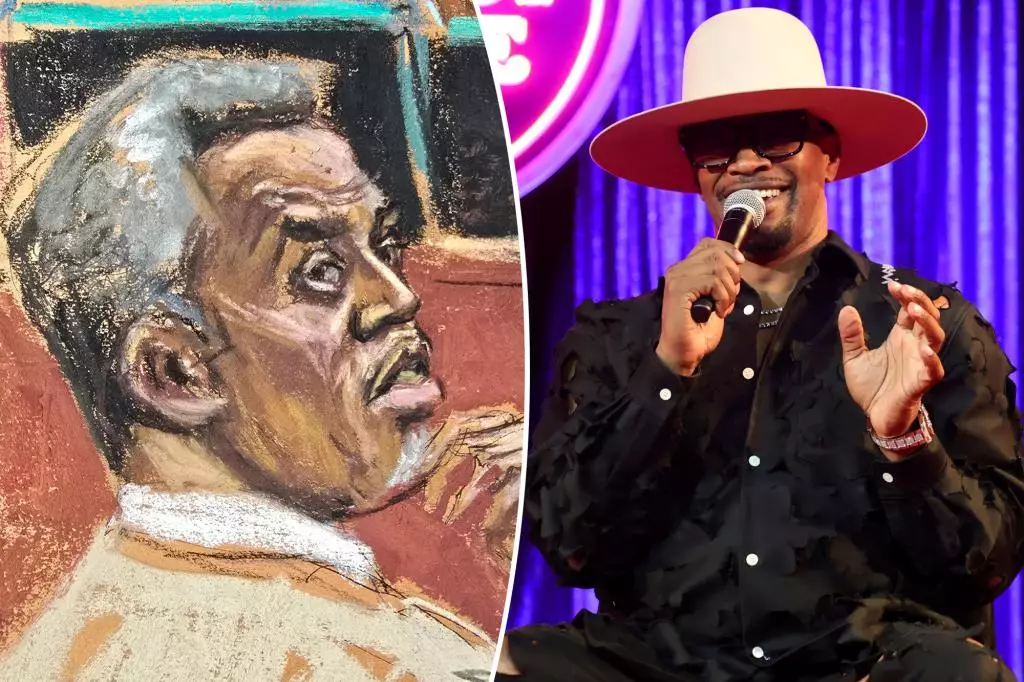In a bold move that ignited waves of discussion, Jamie Foxx recently took to The Comedy Store stage in West Hollywood, where he artfully skewered Sean “Diddy” Combs amid the backdrop of the latter’s disturbing sex-trafficking trial. With undeniable charisma, Foxx crafted a narrative that not only entertained but also prompted uncomfortable thoughts regarding the moral responsibilities of celebrity culture. “That Diddy s–t crazy, huh?” he quipped, initiating a cascade of laughter that belied the seriousness of the allegations against Combs.
Foxx’s approach to comedy has often contained sharp insights into societal norms, but this performance felt uniquely charged. He tapped into the pain felt within the Black community regarding a figure once revered as a hero. Foxx’s candid acknowledgment of Diddy’s alleged misdeeds was more than mere roast material; it encapsulated the stark contrast between pop culture’s glorification of certain icons and the harsh truths that can emerge when the curtain is pulled back. Diddy, once celebrated for his contributions to music, now stands accused of sexually abusive behavior, raising questions about accountability in a system often laden with double standards.
The Weight of Cultural Betrayal
What makes Foxx’s comments resonate is their intersection with broader discussions about cultural icons and the burden of representation. “For the Black people in here, you know how that hurts us,” he exclaimed, referencing Diddy’s former status as a cultural beacon. This was not just humor; it was a poignant critique of the dichotomy between Diddy’s public persona and his alleged private actions. Foxx’s remark about the transformation of a phrase, “It’s all about the Benjamins,” into “It’s all about the baby oil,” captured the devaluation of the aspirational ideals that once defined an entire generation.
The emotional impact of Foxx’s performance is intensified by the unearthing of uncomfortable truths that affect the collective psyche of his audience. Figures like Diddy, who once represented success and influence within the Black community, can rapidly distort into symbols of disgrace when embroiled in scandals of this magnitude. This transformation is crucial for audiences to digest: how do we reconcile the heroes of our community with the darker aspects of their legacies?
The Personal and Public Convergence
Throughout the event, it became evident that Foxx was not merely criticizing Diddy in isolation; he reflected on the broader implications for the landscape of celebrity. Censorship in discourse — the audience’s laughter juxtaposed with Foxx’s poignant critiques — speaks volumes about how humor often masks solemn truths. The ensuing tension between comedy and reality in Foxx’s performance brought forth a critical conversation about the necessity of holding celebrities accountable, even as they inhabit spaces that feel detached from the consequences that their actions may incur.
In light of Diddy’s legal battles, which includes numerous charges like racketeering and sex trafficking, Foxx’s remarks challenge the audience to question the essence of celebrity culture. Why do we allow flawed icons to loom larger than life? Why do we hesitate to confront the uncomfortable narratives when they emerge? Foxx’s bold commentary becomes a vehicle for the audience to engage with these queries.
The Role of Humor in Navigating Accountability
Foxx’s humor in discussing the allegations against Diddy highlights a critical yet often overlooked aspect of societal critique — the role of comedy as a tool for social commentary. Comedy can dismantle the facade of normalcy surrounding issues that would otherwise be troubling to address. It brings to light ugly truths in ways that spur dialogue rather than silence. By weaving humor through serious allegations, Foxx reinforced the notion that laughter should not be a barrier to understanding the gravity of someone’s actions.
His banter, filled with jabs about Diddy’s past phrases and behaviors, holds a mirror up to society, revealing not just the transgressions of a single individual, but highlighting the moral complexities that permeate the entertainment industry. Within the laughter lies a challenge to the audience: to reconcile entertainment with ethics, to differentiate between admiration and accountability, and to embrace the complex narratives that make up the stories of those we idolize.
As we reflect on Foxx’s razor-sharp performance, we are called not just to laugh but to engage deeply with the implications of our cultural heroes and the truths that sometimes lurk grimly beneath the surface.

